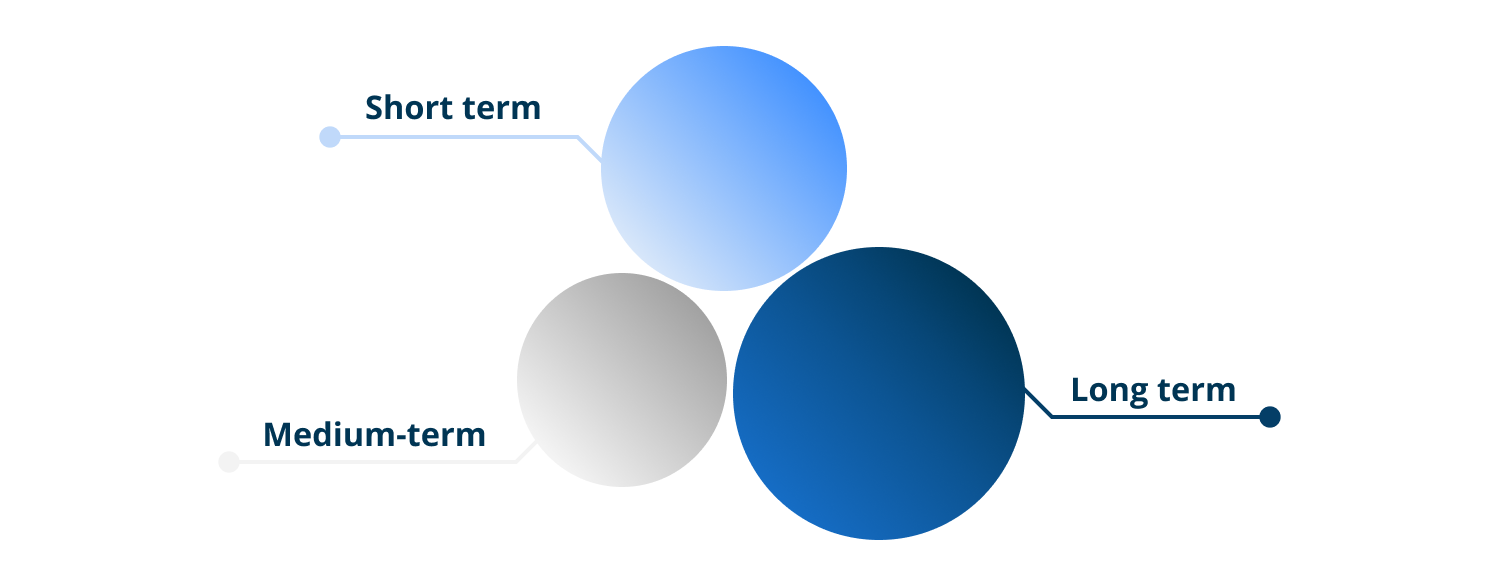Investment horizon: Definition, examples, and how it affects investment strategy
Learn about how investment time horizons can change based on your financial goals, and how to use them to build a solid investment strategy.
Investment horizon meaning: Your investment horizon is the length of time you plan to hold an investment before needing the funds.
Time-based investment horizons: Different investment horizons – short-term, medium-term, and long-term – require different strategies and risk levels.
Factors affecting your investment horizon: Factors like your age, risk tolerance, financial goals, and retirement plans can all influence your investment time horizon.
What is an investment horizon?
An investment horizon, sometimes called an investor time horizon or investment time horizon, is the period an investor expects to hold assets before selling them or using the funds. This time frame shapes an investor’s entire investment portfolio and plays a crucial role in how they manage risk and allocate assets.
Your investment time horizon can range from a few months to several decades. Knowing what an investment horizon is and how it affects your investment strategy is essential for both new and experienced investors.
Different types of investment horizons
Investment horizons are generally categorized into three main time frames: short-term, medium-term, and long-term. Each reflects different investing goals, levels of acceptable risk, and approaches to the market.

Short-term investment horizon
A short-term time horizon in investment generally refers to an investment time frame of one to three years. Investors in this category often prioritize liquidity and capital preservation over growth, especially if funds are needed soon.
There are numerous typical investments. These minimize exposure to stock market volatility:
Money market funds
Short-term bonds
The Raisin marketplace gives you access to various high-yield savings products with competitive interest rates to help you reach your short-term investment goals. Explore Raisin’s offers today and start growing your savings.
Medium-term investment horizon
A medium-term investment horizon spans approximately three to ten years. It strikes a balance between growth and safety, making it suitable for goals such as buying a home or funding education.
Typical investments with medium-term time horizons offer the potential for returns while managing risk. They are usually a part of diversified investment portfolios with a moderate mix of stocks, bonds, and mutual funds.
Long-term investment horizon
A long-term investment horizon typically extends over ten years, giving investors time to ride out market volatility and benefit from compounding. Typical investments include:
What is an example of an investment time horizon?
Consider a 30-year-old investor planning to retire at age 65. Their investment time horizon is 35 years. With such a long investment time, they might build a portfolio with a heavier emphasis on stocks to pursue higher returns, knowing there's time to recover from market downturns.
On the other hand, someone saving for a vacation in two years has a short-term investment time horizon. Their investment portfolio would likely avoid the stock market and include lower-risk, highly liquid options instead.
Factors that may influence your investment horizon
Several personal and financial factors can influence your investment horizon. Understanding these elements can help better align your investment strategy with your specific financial goals and risk profile.
Risk tolerance
You might ask yourself, “What is investment risk tolerance and why is it important?” Your comfort level with risk plays a key role in determining both your time horizon in investment and your investment portfolio. A higher risk tolerance supports longer time horizons and equity investments, while a lower risk tolerance may lead to short-term strategies with safer funds.
Age
Your age significantly impacts your investment horizon. Younger investors usually have longer investment time frames, which allows them to take advantage of stock market growth and compounding returns. Older investors approaching retirement often transition to shorter investment time horizons with more conservative investment portfolios.
Financial goals and current financial situation
Your financial goals — whether saving for a car, college tuition, or retirement — help define the time horizon in your investment planning. Your current income, debt levels, and savings also affect how aggressively, or conservatively, you should build your investment portfolio.
Planned retirement age
Determining your investment time horizon can be a very important part of asset allocation for retirees. Your target retirement age defines one of your most critical investment horizons. If you plan to retire early, your investment time might be shorter, requiring a more balanced or risk-conscious approach. Individuals who expect to work longer might choose to invest more heavily in stocks and other long-term investment assets.
Bottom line
If you want to make smarter investing decisions that match your timeline and goals, understanding your investment horizon is the first step. Whether you're saving for retirement, planning a major purchase, or growing your wealth long-term, aligning your strategy with your time horizon in investment planning helps you manage risk and stay on track. Experts often suggest diversifying your investment portfolio and choosing the right mix of assets – like stocks, bonds, or cash-equivalents – to help meet your financial goals.
Looking for a simple way to get started? The Raisin marketplace gives you access to high-yield savings products like money market accounts, helping you grow your short-term or medium-term savings safely while maintaining liquidity. This might work well alongside a long-term investment horizon strategy. Explore accounts and sign up for a free profile to start building a savings portfolio that matches your needs.
The above article is intended to provide generalized financial information designed to educate a broad segment of the public; it does not give personalized tax, investment, legal, or other business and professional advice. Before taking any action, you should always seek the assistance of a professional who knows your particular situation for advice on taxes, your investments, the law, or any other business and professional matters that affect you and/or your business.


